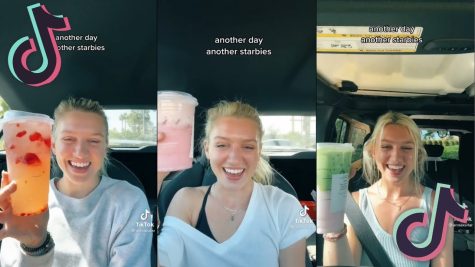Tik-Tok promotion of products
February 16, 2023
TikTok, the social media app notorious for getting users sucked into an additive cycle of constant scrolling, has single handedly transformed youth culture in recent years. The app has become not only a primary source of entertainment, but an important business tool due to its ability to quickly reach a wide and exploitable audience. Even well known brands, such as Guess, Levi’s and more, have created accounts on TikTok, partnering with popular influencers who use their platforms to promote the brand’s merchandise. Numerous products have gone viral, becoming fashion and style staples.
Many influencers make a career out of posting on TikTok, and their success largely relies on money made from brand partnerships. Influencers generally partner with brands corresponding to their niche, which is the specific topic that most of their content surrounds. Such partnerships are extremely beneficial for both parties. Influencers with significant followings use their platforms to achieve a public perception that portrays them as personable and relatable, acquiring loyal followers who become easily enticed into buying products if a trusted influencer demonstrates approval of it.

Regardless of whether or not influencers have partnerships with brands, oftentimes when viewers notice an influencer frequently using a specific product, viewers associate the product with the influencer. Devoted followers will purchase such products in an attempt to model certain aspects of their lives after those they follow on TikTok.
One popular TikTok user, Anna Sitar, has earned a TikTok verification and gained a loyal following of around 10 million by promotion of one brand in particular, Starbucks. She gained a large part of her following by posting videos of her taking frequent trips to Starbucks and recommending certain drinks. While this was not an official partnership, it earned her many fans and increased the brand’s popularity among teens and young girls.
“Anna Sitar is so relatable and funny, and a really likable person,” Sarah Taylor (’25) said. “She would take requests from people in her comments and go to Starbucks, get the drink they requested, and then react to the drinks. That encouraged me to go to Starbucks and try those drinks myself.”
Products don’t always need partnerships or influencer promotions to gain traction on TikTok. Countless products have gone viral on the app, causing significant spikes in demand. For example, the Stanley tumbler, a large, stainless steel travel cup, has skyrocketed to fame as a result of social media publicity. Rowan Welch (’25), a Madison student who carries her cup around school daily, purchased it because of its growing popularity on TikTok and other social media platforms.
“Stanley’s mainly got popular from bloggers in Utah partnering with Stanley,” Welch said. “They would share about it on Instagram and TikTok.”


